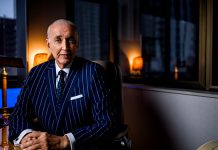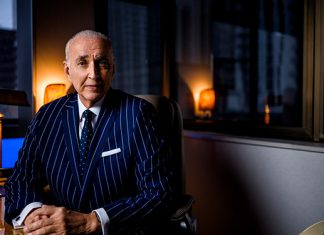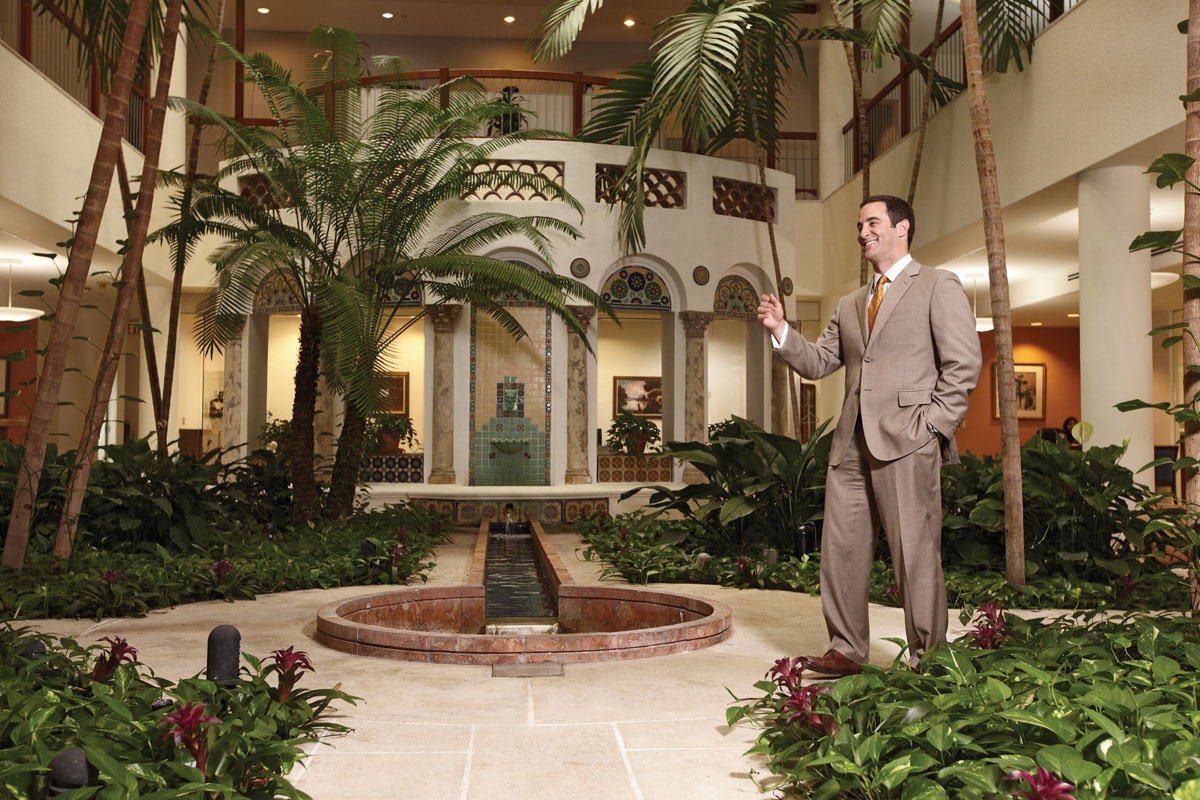 Walking into Apollo Bank in the heart of Brickell is like stepping inside a utopia of sorts. There’s a center atrium, lush gardens, multiple stories of marble staircases and happy people at every turn. You wouldn’t know it was a bank except for all the checkbooks, transactions and financial chatting happening in the background. But before we get more into Eddy’s latest venture, it’s important to understand how he ended up helming what is today considered one of the cleanest banks in Florida.
Walking into Apollo Bank in the heart of Brickell is like stepping inside a utopia of sorts. There’s a center atrium, lush gardens, multiple stories of marble staircases and happy people at every turn. You wouldn’t know it was a bank except for all the checkbooks, transactions and financial chatting happening in the background. But before we get more into Eddy’s latest venture, it’s important to understand how he ended up helming what is today considered one of the cleanest banks in Florida.
Eddy was born into a family of entrepreneurs. His grandfather arrived to the U.S. from Cuba with nothing and started a small printing business called Avanti that would eventually grow into a full-service one-stop shop. By the time Eddy was born, his dad had already joined into the family business. “Some of my fondest memories growing up took place in my dad’s office,” says Eddy. “I remember he always had a yellow legal pad and pen on his desk to jot down his various to-do lists…to this day, I follow that tradition and make sure I have plenty of them around to keep track of everything I have to do.”
In high school, Eddy was a good student, getting involved in everything he could. When it came time to picking a college, he chose Boston College. From the moment he arrived on campus, Eddy knew he wanted to get into business, after all, it was the only professional model he’d seen growing up. “My dad worked incredible hours and was very successful,” he says. “I never remember him hanging out at the house, coming home early or leaving the house late — it was a no-brainer for me early on that I’d either work for myself or for the family business.”
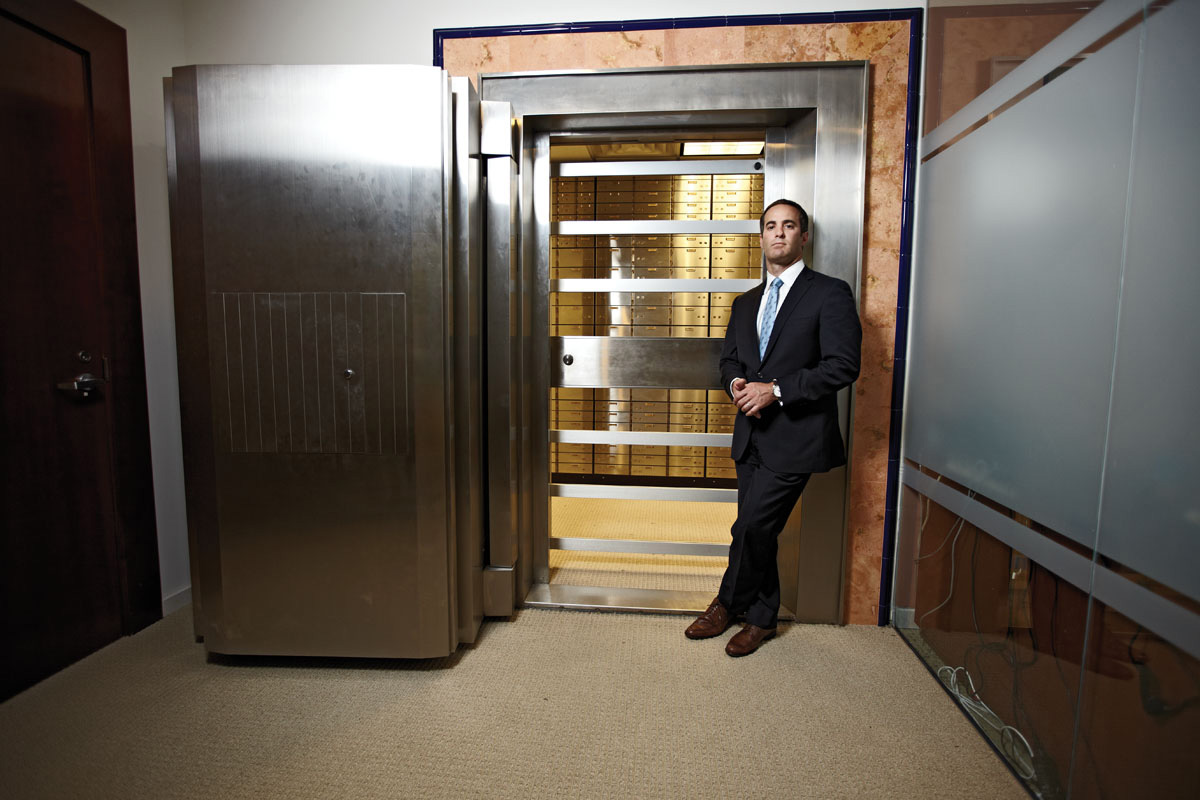 At the end of his sophomore year, he returned home for summer break and was suckered into a last-minute project his dad asked him to take on. It involved interviewing a big portion of the more than 500 employees his dad’s company had amassed over the years. “For the first time in my life, I saw what a difference my dad had on the lives and families of his employees — it was a part of the business I’d never considered before,” he says. “I had an epiphany almost instantly that I wanted to be involved with people, and with leading people…I was attracted to the idea that by owning your own business you have the power to make your company better than everyone else’s.”
At the end of his sophomore year, he returned home for summer break and was suckered into a last-minute project his dad asked him to take on. It involved interviewing a big portion of the more than 500 employees his dad’s company had amassed over the years. “For the first time in my life, I saw what a difference my dad had on the lives and families of his employees — it was a part of the business I’d never considered before,” he says. “I had an epiphany almost instantly that I wanted to be involved with people, and with leading people…I was attracted to the idea that by owning your own business you have the power to make your company better than everyone else’s.”
As the summer progressed, Eddy remained engaged in other projects at Avanti. By the time he returned to college to begin his junior year, Eddy’s mindset had changed dramatically. “The next thing I know, I’m balancing my studies with conference calls and flying on red-eyes all over the country closing deals for my dad,” he says. “All my free time was dedicated to figuring out how to make my dad’s business go to the next level.”
Once he graduated college in 1994, he naturally went to work at Avanti. “When I actually started working for my dad full-time, it immediately hit me that I should have given this more thought!,” jokes Eddy. “Being a son and employee is a tough position to be in. Let’s just say we didn’t always see eye-to-eye on everything!”
Then in late 1995, Eddy saw a giant wave coming called the Internet. “I remember thinking that this was going to change everything,” he says. “But my dad didn’t want to dive in full-force like I did,” he says. But the lure of the Internet and all the possibilities it presented was too much for Eddy to ignore, so he took a step back from Avanti to start his own web development company called U.S. Web. Soon thereafter, he went to the epicenter of the excitement, Silicon Valley. “I wanted to get as much information as I could by networking, meeting people, asking questions and learning everything I could about this new technological phenomenon,” he says.
His excitement, however, was not shared by all. “I remember going to companies at that time to pitch my ideas and quickly began to realize that many of them didn’t even have email,” he says. As a result, his entrepreneurial senses kicked in and he began offering email set-up services to the people he met with. “I started carrying around email software CDs with me to every meeting,” he says. “I’d charge $5 and set up their systems just so that I could communicate with them!”
Then in 1996, he had a meeting with Burdines that changed the course of his business path in an unexpected way. “I was in a boardroom with about a dozen Burdines execs giving them a presentation on how my company could help them grow. Everything seemed to be going great — they were engaged in what I was telling them, they were asking me questions,” he says. Then at the end of his presentation, one of the higher-ups took him aside and said he was really impressed, but he wasn’t really sure how Burdines was going to handle the online ordering workflow. “A lightbulb instantly went off in my head,” says Eddy. “That meeting helped me realize that I needed to start offering fulfillment center options as part of my pitch.”
So he approached his dad about partnering U.S Web’s Internet services with Avanti’s existing fulfillment facilities as a way to offer potential clients more added-value. “It took a little convincing, but he quickly saw the potential in this new business model,” he says. “We got to work right away.”
Eddy was re-energized thanks to the new portfolio of services he now had in his arsenal. They named their new distribution arm Inktel Direct. “I was certain things were going to get better, but as I met with more companies, I realized that they were more interested in fulfillment services than web development,” he says. “I started to accept the fact that Inktel was growing far too rapidly for me to continue focusing on U.S. Web.” This is when Eddy had to make the tough decision to shutter his baby. “It felt like having a close family member die,” he says. “In retrospect, I was actually striking out at an acceptable rate, I was just too young to realize it.”
Eventually, some of Eddy’s brothers showed interest in getting involved in Inktel, but Eddy wasn’t keen on returning 100% to the family business. “My dad basically gave me an ultimatum — either focus on this opportunity with him or he was going to hire someone else to do it,” he says. “I knew I’d do a better job than anyone else, and this was, at the end of the day, my family’s livelihood.”
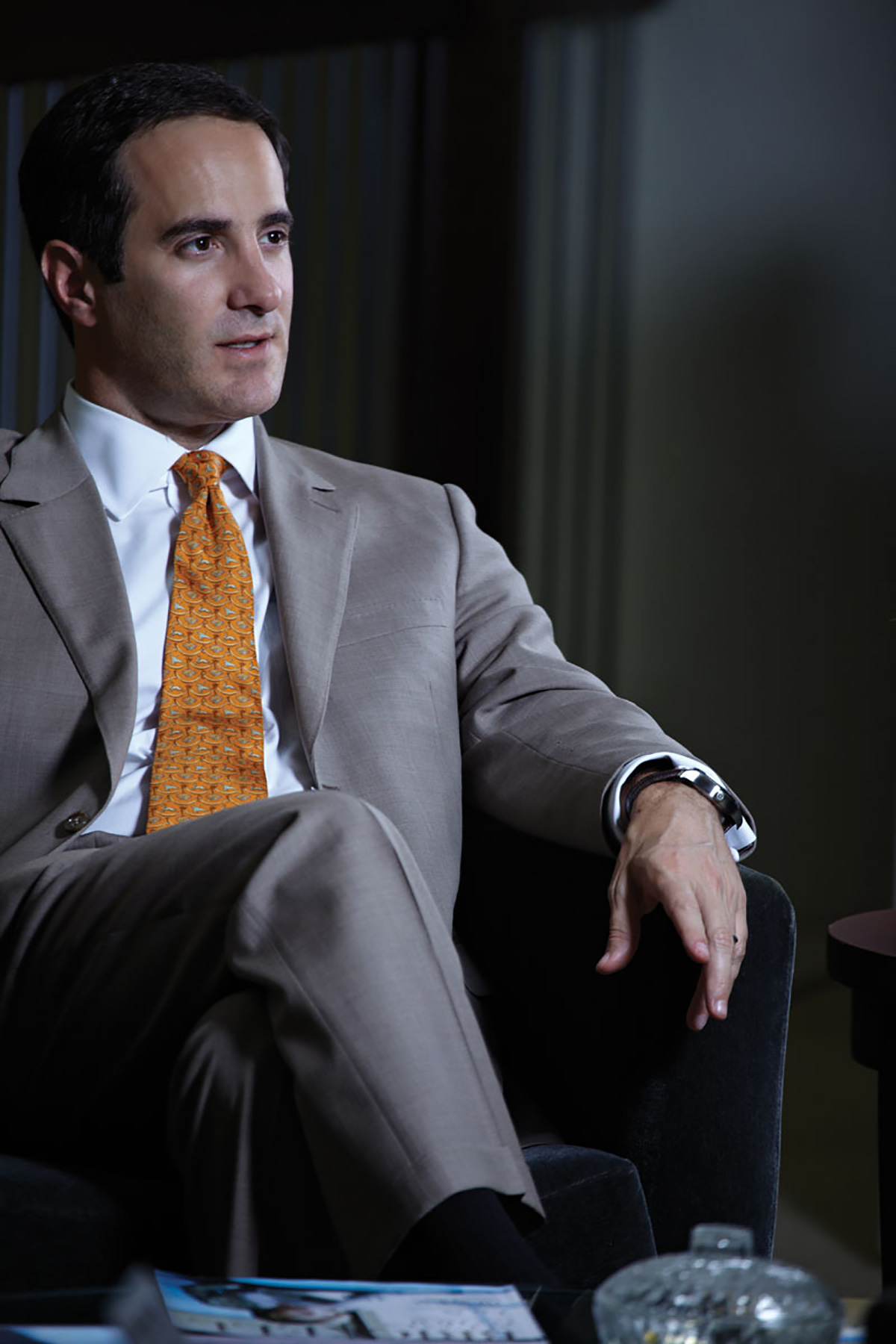 Eventually, however, his entrepreneurial spirit got the best of him. On Sept. 15, 2007, he sat his family down to share some news. “I explained to my dad and brothers that I wanted to create my own legacy, forge my own path,” he says, mentioning that he told them he had absolutely no idea what that would be, but that he’d figure it out by the end of the year. “The hardest part was convincing them that there was nothing they could do to make me change my mind.”
Eventually, however, his entrepreneurial spirit got the best of him. On Sept. 15, 2007, he sat his family down to share some news. “I explained to my dad and brothers that I wanted to create my own legacy, forge my own path,” he says, mentioning that he told them he had absolutely no idea what that would be, but that he’d figure it out by the end of the year. “The hardest part was convincing them that there was nothing they could do to make me change my mind.”
It took Eddy until New Year’s Eve that year to settle on his next move. After all, he’s not one to jump into a new business without doing his research first. And for Eddy, that means living and breathing his options day in and day out. As he was retracing his career up to that point, something on his resume caught his eye. Since 2002, he’d been on the board of TotalBank. “It was my ‘aha’ moment,” he says. “I always loved the idea of community banking — it’s a perfect scenario for making money while providing value and making a difference in people’s lives.“ After speaking with people across the country who had gone into banking, he started connecting the dots and set a goal for himself to start working on launching a bank as soon as the new year started.
Once he finally announced his new venture to his family, they thought he’d lost his mind. “My dad basically said I was an idiot,” he says. “I took his concerns to heart, of course, but there was no stopping me.” Eddy dedicated the first quarter of 2008 to lure investors, find legal counsel, meet with regulators, build his board and find an experienced CEO.
The first step he accomplished was finding a lawyer. He just happened to be one of the top banking attorneys in the country. “It was so difficult to find a firm that would work with me and that didn’t have a conflict of interest,” he says. “When I first met Chet A. Fenimore of FKHF in Texas, he told me I reminded him of a lot of his clients who had made it in the banking business. This was just what I needed to hear.”
“No matter what you want to do, it’s going to cost more than you budgeted, take longer than you expected and things will never go as planned, but that’s part of the fun of being an entrepreneur.”
Now that he was legit, it was time to start building his management team. First stop: CEO. “The name Richard Dailey kept coming up,” he says. “Everyone was like ‘Man, you gotta meet this guy’…I didn’t even know him, but I knew I had to hire him,” he says. “When we finally met, we clicked instantly. He said that whatever I was going to offer him, he’d take it. Today, we’re like a married couple — I do all the talking, and he corrects me when I’m wrong.” CEO…check! The next step was finding a firm to process paperwork and begin accepting investor checks. Silverton Bank was the bank of banks at the time, so they seemed like a natural choice.
“Now that things were on a roll, we had to come up with a name,” says Eddy. “I’d always been inspired by the Apollo lunar mission — just like that voyage to the moon, we didn’t know exactly what we were doing, and we didn’t know exactly how we were going to reach our goal, but somehow we were gonna do it.”
By now, everything seemed to be on track, Eddy had a name, a great team, committed investors, a trusted place to handle his paperwork and potential locations in mind. Then, during a weekend excursion to The Big Apple, Eddy found himself in the midst of a financial crisis that would later come to be known as “The Great Recession” of 2008-12. “As I saw people desperately trying to make sense of what was happening, I thought to myself ‘Is this a sign? Is something trying to tell me to stop?’”
The news was everywhere — the mortgage meltdown was upon us; Bear Stearns, the 5th largest investment bank in the country was sold to J.P. Morgan for $2 a share; and Lehman Brothers, the 4th-largest investment bank in the U.S., filed for bankruptcy. The financial system was teetering on a cliff. To make matters worse, Silverton Bank failed, and Eddy had to scramble to have his investors re-issue their escrow checks.
Not even all the research he’d done could prepare him for the nightmare he was going through. “I remember the call I made to regulators seeking status on the paperwork we’d submitted and basically having them say ‘Wait, what?! Are you calling about opening a bank?!’…Although my paperwork was good, they suggested that I look into acquiring an existing bank instead of opening up a new one,” he says. “And so we moved on to Plan B.”
Around the same time, Eddy got a surprise boost of confidence while attending a National Finance Committee fundraiser in D.C. Amid a sea of famous actors, actresses and pop stars, he spotted his idol, Jamie Dimon, head of JPMorgan Chase. “I went right up to him as he was being ushered off to meet with some senators and told him I was starting a bank in Florida,” he says. “He just stared at me in disbelief and said ‘That’s the best idea I’ve heard in a long time!’ He went on to share some amazing Florida banking statistics that got me even more energized to continue pursuing my goal.”
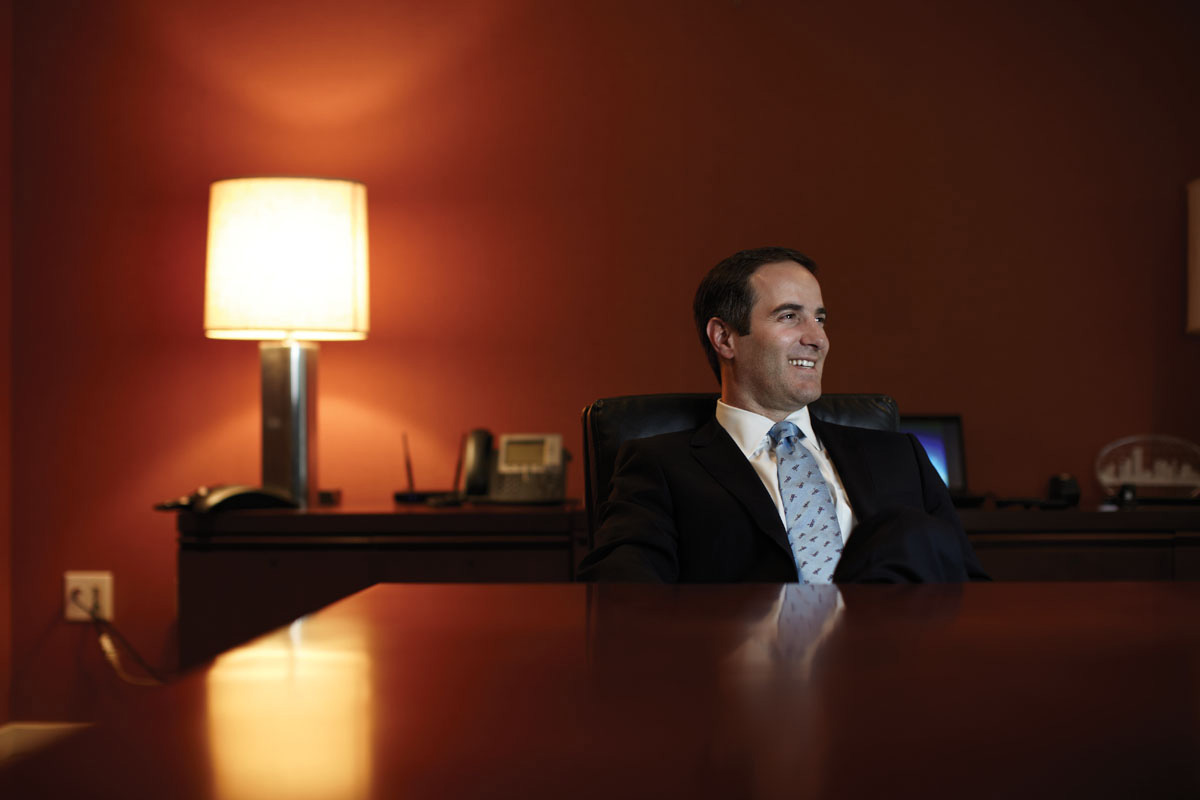 During the following months, Eddy focused on convincing the investors that there was no way they were going to fail. “My pitch was simple: 1.) Believe in the concept that a well-run community bank is a conservative good investment over the long-haul…not a quick get-rich scheme; 2.) I’d ask: ‘Do you believe that the U.S. and the State of Florida are a good investment?’ Most would answer ‘Absolutely.’ Well, then, I’d explain, a bank makes perfect sense; 3.) After I got their attention, I’d convince them why our team was uniquely qualified to solve the problem; 4.) Finally, I’d explain that we were planning to acquire an existing brand and thus get traction almost immediately. At the end of the day, these folks made a commitment to me personally…they believed in me. I couldn’t let them down.”
During the following months, Eddy focused on convincing the investors that there was no way they were going to fail. “My pitch was simple: 1.) Believe in the concept that a well-run community bank is a conservative good investment over the long-haul…not a quick get-rich scheme; 2.) I’d ask: ‘Do you believe that the U.S. and the State of Florida are a good investment?’ Most would answer ‘Absolutely.’ Well, then, I’d explain, a bank makes perfect sense; 3.) After I got their attention, I’d convince them why our team was uniquely qualified to solve the problem; 4.) Finally, I’d explain that we were planning to acquire an existing brand and thus get traction almost immediately. At the end of the day, these folks made a commitment to me personally…they believed in me. I couldn’t let them down.”
Around May 2009, when the deadline began to approach for selecting a bank to acquire, Eddy and his team had surmised that some were simply too far gone to consider, while others were poorly managed disasters from the get-go. They whittled it down to Union Credit Bank, which was owned by a Chilean family at the time. “We liked them almost immediately,” says Eddy. “They kept assuring me that even though they had other bidders, that we were getting the deal, that we had a good bid and not to worry because we were in the lead.” After weeks of intense back-and-forths, all of a sudden, they go radio silent. And then Eddy got the call he was dreading: Someone else got the bid.
Two weeks later, on a Friday, after the board decided on a deal to purchase another bank, they got on a conference call with Eddy and asked him and his team to finalize the paperwork over the weekend so they could sign the deal first thing Monday.
Toward the end of the meeting, Eddy got a call from Union Credit Bank explaining the deal with the other bidders had fallen apart. “We got together that afternoon and literally drafted a deal on the back of a napkin at Panera Bread in South Miami,” he says. “They wanted to stick to the original agreement, but I told them that this was no time for negotiations and we were in a take-it-or-leave-it situation.” When the investors asked Eddy on Monday morning why they hadn’t received the paperwork to purchase the other bank, Eddy told them Union Credit Bank was back in play, and the rest is history.
Despite the fact that the bank had never really turned a profit since it’s inception, Eddy and his team were able to be profitable by the 6th month, and today Apollo Bank’s assets have grown from $145 million to $215 since its launch in 2010. Eddy attributes part of that success to the unique perspective he brings to the field. “During my first day on the job, everyone just kind of looked at me thinking I was nuts — they couldn’t believe this was the first time I was officially on the clock at a bank,” he says. “I promised them I wouldn’t let them down.”
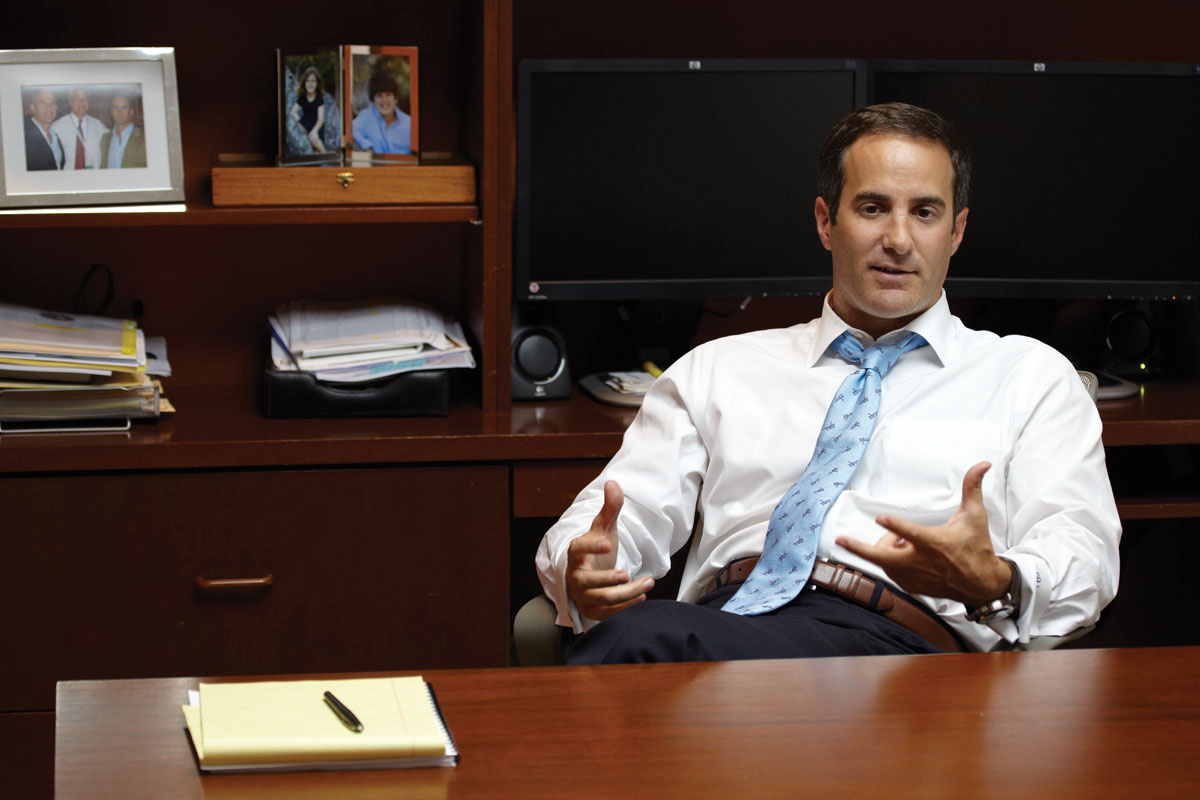 In 2012, an old friend gave Eddy a call. President Barack Obama asked him to serve on the Board of Directors of the Inter-American Foundation (IAF). It was an offer Eddy couldn’t refuse. He’d first met the President a decade earlier at the heels of his Senate run in 2002, donating money to his campaign and supporting him however he could. “When he first came down to Florida to raise money for his party, he didn’t know anybody so my brother and I would hang out with him while he was in town,” he says.
In 2012, an old friend gave Eddy a call. President Barack Obama asked him to serve on the Board of Directors of the Inter-American Foundation (IAF). It was an offer Eddy couldn’t refuse. He’d first met the President a decade earlier at the heels of his Senate run in 2002, donating money to his campaign and supporting him however he could. “When he first came down to Florida to raise money for his party, he didn’t know anybody so my brother and I would hang out with him while he was in town,” he says.
Eddy recalls a pivotal moment in their relationship when he asked Obama about a potential Presidential run. “He wasn’t convinced it was the right time to do it, but I told him to go for it anyway…after all, even if he didn’t get the nomination, maybe he could be VP,” Eddy recalls. “Barack looked me square in the eye and said ‘Eddy, people don’t run for President to maybe become VP’…I was so embarrassed. When we left that day, I remember saying to my brother how cool it would be if one day we could say that we know someone who ran for President…ha!”
So what advice does this established entrepreneur have for others with a desire to start their own business? He doesn’t hesitate with a response that resonates from his own experiences. “Always keep in mind that no matter what you want to do, it’s going to cost more than you budgeted, take longer than you expected and things will never go as planned, but that’s part of the fun of being an entrepreneur.”
And, he says, it’s important to keep your priorities in order and your goals in perspective. “Money should never be the main motivator in anything that you do — you shouldn’t go into business dreaming of cruising the high seas on a yacht drinking piña coladas and daiquiris…those things will be available to you eventually if you work hard enough and set realistic goals,” he says. “No matter how far the finish line may seem, you should never for a second think that quitting your dreams is ever an option.”






